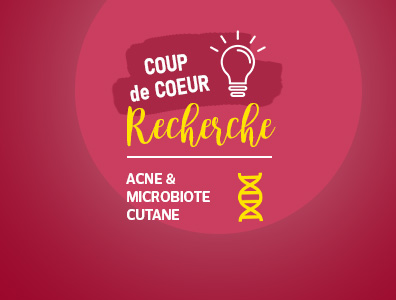
Coup de cœur RESEARCH
Spotlight on acne and skin microbiota
Acne is a common skin inflammation that primarily affects teenagers, but also some adults. An inflammatory disease of the pilosebaceous follicle, it is characterized by an increase in sebum production associated with the obstruction of hair follicles and the proliferation of microorganisms that are usually well tolerated. The skin’s microbiota (ecosystem of microorganisms) and the host’s immunity play an important role here. Several studies have shown an altered microbial composition in acne. Staphyloccoccus epidermis(S. epidermis) and Cutibacterium acnes(C. acnes) are commensal bacteria that protect and prevent microbiota imbalances by fighting pathogens. They contribute to skin homeostasis by producing beneficial bacterial metabolites. C. acnes is commonly found in sebum-rich areas. In acne, these bacteria proliferate and secrete inflammatory substances.
Acne causes skin lesions, ranging from minor comedones to severe papules, pustules or nodules that leave scars, with significant psychosocial consequences (anxiety, social isolation, depression) that require treatment. Treatments include skin care, local or oral antimicrobials, retinoids, benzoyl peroxide and oral contraceptives. With traditional antibiotic-based treatments against disease-targeting bacteria such as C. acnes becoming less and less effective as resistance increases, new therapeutic avenues need to be explored.
In this context, the EBInnov® team is developing a research project to study the microbiota of the areas of the face most prone to acne – the forehead and cheeks – from a genomic and metagenomic perspective. Genomics is the study of how an organism, an organ, a cancer, etc. functions. on a genome-wide scale, rather than on the scale of a single gene. Metagenomics or environmental genomics studies the genetic content of samples from complex ecosystems (e.g. intestine, skin, soil, air, etc.) taken from nature (as opposed to samples grown in the laboratory). Through direct sequencing of theDNA present in the sample, this approach not only provides a genomic description of the sample’s content, but also an insight into the functional potential of an environment. The EBInnov® team’s ambition is to characterize the microbial ecosystems of the skin of healthy people and acne sufferers, for different ethnic groups.
Read more : Prof. Dr. Phuong LE











